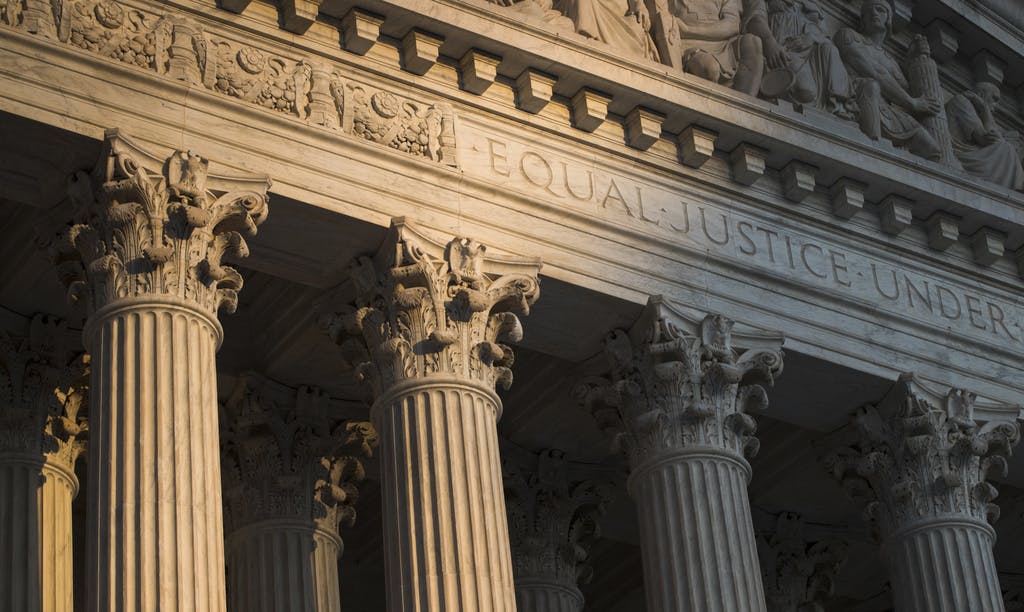Supreme Court To Hear First Second Amendment Case Since Bruen
The case will test the limits of Second Amendment rights for the first time since the Court’s landmark ruling in Bruen.

For the first time since the landmark New York State Rifle and Pistol Association vs. Bruen, the Supreme Court will hear a case concerning the limits of the right to bear arms in United States vs. Rahimi next week.
The case, coming out of Texas and the Fifth Circuit Court of Appeals, centers on a law that bars anyone who is the subject of a restraining order because of domestic violence from owning a gun.
In the case, attorneys for the plaintiff, Zackey Rahimi, argue that the law violates the Second Amendment. Rahimi was involved in five shootings in December 2020 and January 2021, which resulted in the police searching his house.
In one incident, Rahimi was in a car accident and shot at the driver of the other car. In another, he fired his gun into the air when his credit card was declined at a restaurant.
Police, after identifying Rahimi as a suspect, obtained a warrant and searched his home, where they found a rifle and a pistol. Rahimi was barred from possessing these weapons because he was the subject of a restraining order from early 2020 for having allegedly assaulted a former girlfriend.
Rahimi was then indicted for violating the code banning those subject to domestic abuse restraining orders from possessing guns. He asked the court to dismiss the charges, arguing that the law violates the Second Amendment.
Upon appeal to the Fifth Circuit, the court initially upheld the law, ruling against Rahimi. After the Supreme Court handed down Bruen, though, the Fifth Circuit issued a new opinion, ruling that the law was unconstitutional.
In a concurring opinion with the newer Fifth Circuit ruling, Judge James Ho wrote that his decision to change their previous ruling was based on an application of Bruen and the fact that the law in question “disarms individuals based on civil protective orders — not criminal proceedings.”
“Moreover, there are additional reasons why disarmament based on civil protective orders should give us pause. Scholars and judges have expressed alarm that civil protective orders are too often misused as a tactical device in divorce proceedings — and issued without any actual threat of danger,” Judge Ho wrote. “That makes it difficult to justify [the statute] as a measure to disarm dangerous individuals.”
Judge Ho went on to write that there was “no analogous historical tradition sufficient to support” the law in question, a standard applied by the high court in Bruen.
The case has attracted significant attention from interested parties outside the state of Texas, like Governor Newsom, who filed an amicus brief arguing that attempting to find a historical analog for this regulation relative to domestic violence would be impossible.
“Domestic violence was not civilly or criminally prohibited at the founding, at ratification, or during the Reconstruction period,” Mr. Newsom argues in the brief, noting that domestic abuse laws in most states first arose in the late 19th century.
Mr. Newsom added in the brief that there “should be no dispute that our historical tradition allows elected leaders to define new crimes and enact new laws to reflect contemporary morals and address modern social ills.”
“The decision below is just one example of lower courts misreading Bruen to require striking down even reasonable restrictions well-grounded in our nation’s historical tradition of regulating firearms,” Mr. Newsom argues.
On the other side, the conservative and libertarian Cato Institute filed a brief arguing that people who have domestic abuse restraining orders filed against them are not informed that their guns could be taken away.
Thus, the institute writes, there is “no compelling reason for most people to vigorously challenge the issuance of an order commanding them not to do something illegal or unethical.” They argued that people who might have a restraining order placed against them actually do have a reason to not participate in the hearings, the cost of hiring attorneys.
For this reason, the institute writes, the goal of the statute in question is “vital,” but “Congress should have both the opportunity and the impetus to advance those goals in a constitutionally compliant statute.”

